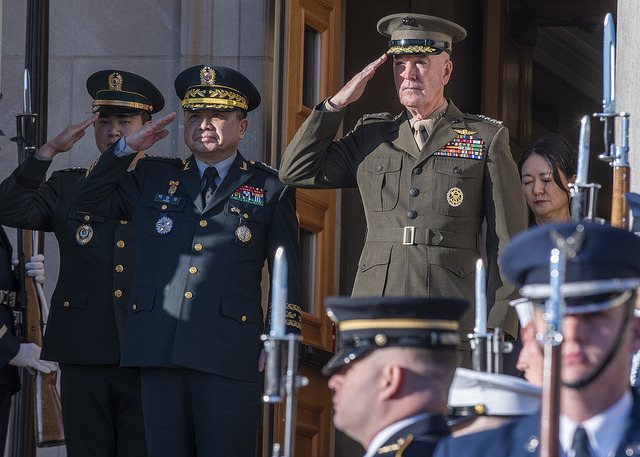The military chiefs of South Korea, the United States and Japan met in Washington Friday to discuss cooperation on regional contingency and peace issues, the Pentagon said.
The talks were led by South Korea's Joint Chiefs of Staff Chairman Gen. Park Han-ki and his US and Japanese counterparts, Gen. Joseph Dunford and Adm. Katsutoshi Kawano, the Pentagon said in a press release.
The leaders were also joined by US Indo-Pacific Command chief Adm. Philip Davidson, US Forces Korea commander Gen. Vincent Brooks and US Forces Japan commander Lt. Gen. Jerry Martinez.
 |
(Yonhap) |
"This session featured discussions on multilateral cooperation that ensures readiness to respond to any regional contingency and promotes long-term peace and stability in northeast Asia and the Indo-Pacific," the release said.
"Gen. Dunford reaffirmed the ironclad commitment of the US to defend both the ROK and Japan if called upon and to provide deterrence guaranteed by the full spectrum of US military capabilities," it added, referring to South Korea by its official name, the Republic of Korea.
The three agreed to continue working together on mutual security issues and boost multilateral cooperation for peace and stability in the region.
The tripartite meeting was last held in May, and seven times since July 2014, according to the Pentagon.
Park and Dunford met separately on Thursday for the allies' annual Military Committee Meeting.
"During the discussions, Gen. Dunford and Gen. Park received updates on the security of the Korean peninsula and the Indo-Pacific region and addressed measures to strengthen the Alliance's defense posture and efficient transition of wartime operational control from the US-led Combined Forces Command to a ROK-led Future Alliance Command," the Pentagon said in a separate release.
Dunford was quoted as reiterating the US' "firm and unwavering" commitments to South Korea, including by providing extended deterrence.
"He reaffirmed that the US remains prepared to respond to any attack on the Korean Peninsula, using the full range of US military capabilities," the Pentagon said. (Yonhap)




![[Herald Interview] 'Trump will use tariffs as first line of defense for American manufacturing'](http://res.heraldm.com/phpwas/restmb_idxmake.php?idx=644&simg=/content/image/2024/11/26/20241126050017_0.jpg)


![[Health and care] Getting cancer young: Why cancer isn’t just an older person’s battle](http://res.heraldm.com/phpwas/restmb_idxmake.php?idx=644&simg=/content/image/2024/11/26/20241126050043_0.jpg)
